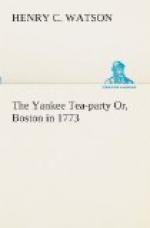A well-laden table extended the whole length of the room, and flags, banners, and appropriate emblems and devices, were hung on the walls. There was no formal organization, as at public festivals, no president elected, and no list of toasts prepared. It was intended to be a sociable gathering. No band of well-arranged and harmonized instruments appeared, but old Jacob Brown and old Samuel Hanson, a fifer and a drummer of the continental army, occasionally stirred the hearts and fired the eyes of the company with the music which had nerved the patriots of Bunker’s Hill and Bennington. Each of the veterans sat in an arm-chair at the table, the young men being distributed among them so as to wait upon them occasionally, and show them every attention.
Mr. Kinnison, though not the oldest man of the company, looked as if he had seen the hardest service, and received the hardest buffets of Time. His features bespoke a strong and energetic mind, and his eye was full of fire and activity. His hair was grey and bushy, partly covering a large scar on his high forehead. He had evidently been a man of powerful frame, but was now bent with the weight of years, and service. The other veterans appeared to be generally of the same age, and to have seen hard toil and service. The fifer was the most remarkable of the party. In spite of his age and white hair, his puffed cheeks and the sly twinkle of his eyes gave him a kind of jolly, frolicsome appearance, which would indicate that age could not chill the humor of his heart.
THE LEBANON CLUB.
When the company were fairly seated at the table, Mr. Kinnison opened the conversation by asking the young men if they had ever heard any account of the Lebanon Liberty Club. They replied they had heard of the club, but never any definite account.
“Well,” said Mr. Kinnison, “I can tell you something about it. Mr. Pitts, Mr. Colson, and myself, were members of a club consisting of seventeen men, living at Lebanon, up here in Maine. Most of us were farmers. We knew what them folks over the river were aiming at, and we knew that there was no use of dallying about matters. Our rights were to be untouched, or there must be a fight. So, you see, we Lebanon men resolved to form a club, to consider what was to be done, and to do accordingly. We hired a room in the tavern of Colonel Gooding, and held regular meetings at night. The colonel was an American of the right color, but we kept our object secret, not even letting him into it.”
“If it isn’t too much trouble, Mr. Kinnison, we should like you to tell us all about what the club had to do with the tea-party, and how that affair was conducted,” said one of the young men, named Hand, filling the veteran’s plate.
“He can tell you much better than any one else,” remarked Mr. Pitts. “I can vouch for the bold part he took in it, and he has a better memory than the rest of us.”




